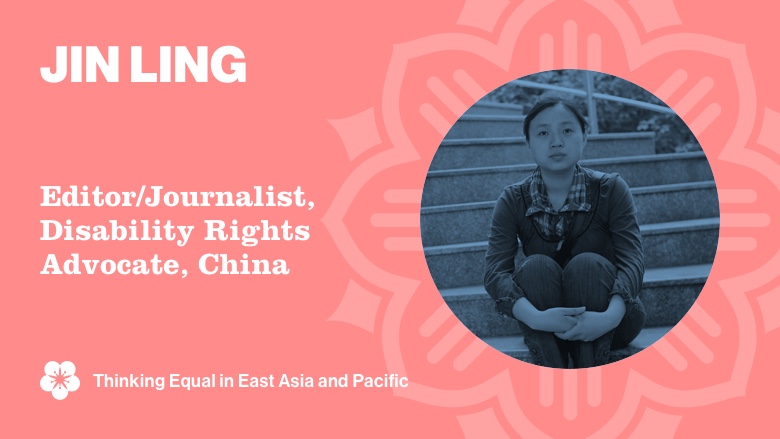Thinking Equal in China: Jin's Path in Disability Rights
World Bank,March 07, 2019 Adjust font size:

On International Women’s Day 2019, we are sharing stories of women doing inspiring work across East Asia and Pacific. Whether in the business world, advocacy, media or countless other sectors, their contributions highlight the transformative power of women in the region. Jin Ling is a journalist and advocate for the rights of people with disabilities through the Disability-Affected Women Support Group in China.
Tell us about yourself.
I’m an international cooperation editor at China Development Gateway, an online source of development information and tools in China. I’m also a mother to a 4-year-old boy. I was born with a genetic eye disease and lost almost all of my eyesight during my first year of university. After graduation, I received radio training from the One Plus One Beijing Disabled Persons’ Organization and became a radio program producer. In 2015, with several other disabled women, I founded the Disability Affected Women Support Group (DAWS).
What inspires you to get up in the morning? What drives you?
I find lots of stuff interesting to learn and to explore. I subscribe to several WeChat public accounts and podcasts. Some teach English, some talk about different cultures, some share experiences and stories of being a mother or a person with disability. They answer my deeper questions; help me understand the world and myself more. They make clearer to me the kind of person I want to be and make me strive towards it.
What set you on this path?
The puzzles I encountered make me start to think and explore an answer. For example, what jobs can I as a visually-impaired person do to earn my living, what are my strengths and weaknesses, what games can I play with my son without eyesight, or what is the proper attitude to approach my disability with.
What advice do you have for young women who want to take a similar path?
Start to read, to communicate with people, to try different things when you feel puzzled about yourself, about your future. This will help you understand yourself more, or even open up a very new world to you.
Do you have a favorite quote or saying?
My favorite quote or saying varies in different stages of my life. I now love the saying of a WeChat public account that I subscribe to: “Dear, I cannot tell you how you should live your life, but I can tell you a story”. Because the stories it shared provide me with a different way of viewing my past, my values and my future. Different people may have different feelings to a same story, but the experiences in it will help shape their value system.
What are the biggest issues in China right now and how can they be addressed?
I think China needs to continue enhancing international cooperation and integrate more into the world. Although different countries face different challenges, all countries are searching for solutions to common issues, such as poverty and disability. When I was studying in India, many of my classmates had asked me the same question — what is China’s development experience. I was curious about theirs too. We all found sharing contributed to solving our respective problems. After becoming an international cooperation editor at China Development Gateway, I am more aware of the importance of enhancing exchanges and knowledge sharing to solve the common challenges facing humankind.
The Chinese government is implementing a series of policies to reduce rural poverty and revitalize its villages. I think this contributes a lot to one of my main concerns— left-behind children, especially those with disabilities, because more and more people can earn a living without leaving their homes.
Many organizations, both domestic and international, have also paid attention to this issue, searching for solutions and providing professional services. International cooperation not only brings new ideas and experiences to China, but also takes China’s experience to the world. These are valuable assets to all.
China also needs to further its efforts in accessibility, such as accessibility of physical facilities and information accessibility. Accessibility not only enables people with disabilities to participate more in society, but also makes life easier for the nondisabled. For example, ramps not only allow wheelchair users access to buildings, but also bring convenience to those who carry prams, luggage, or are riding a bike. However, not everyone understands the importance of accessibility. So advocacy, best practices, specific solutions are needed badly.
Where do you see China in 25 years?
I think China will link more closely with the world after 25 years. The public will be better educated and care more about public goods. Ideas such as environmental protection and accessibility will become common knowledge. China will become more beautiful, pollution free and comfortable to live in. People with disabilities will participate more in society. There will be more job opportunities in villages, more children will live with their families and receive more social support.
What change would you like to see that could bring greater equality in China?
I hope more and more people will understand and respect the rights of disability-affected women, i.e. women with disabilities and their female relatives, and give them more support to participate in the society. I hope they can be able to view themselves more positively, receive more professional support and services.
If you could use one word to describe women in East Asia Pacific what would it be?
Tenacious.

